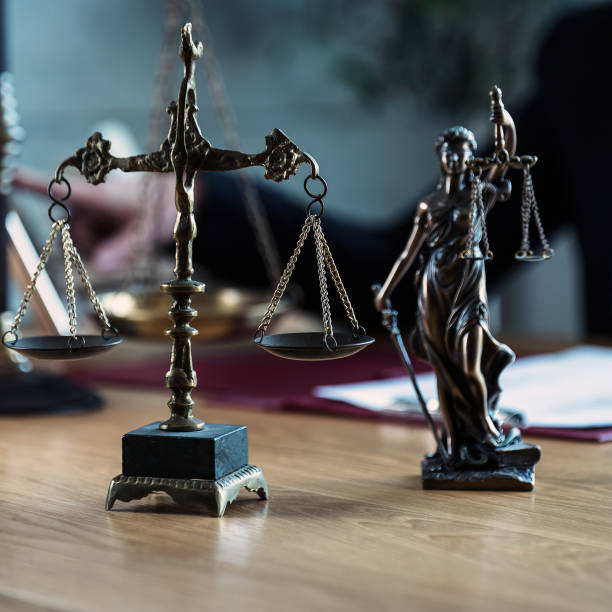





Welcome to Kehinde Yekeen & Co.
Kehinde Yekeen & Co. is a full-service Law Firm based in Lagos, Nigeria. Established in 2014, our firm is a trusted legal partner providing exceptional regulatory, litigation, and transactional solutions to clients’ most complex challenges.
What we stand for!
- Client-Centered Advocacy
- Integrity and Transparency
- Excellence in Legal Expertise
Our Legal Practice Areas
Explore Our Comprehensive Legal Services
Frequently Asked Questions
Choosing a personal injury lawyer is a critical decision that can significantly impact the outcome of your case. Here are some key steps and considerations to help you make an informed choice:
1. Assess Your Needs
- Determine the specific nature of your injury and the type of expertise required.
- Consider the complexity of your case and the level of experience you need in a lawyer.
2. Research Potential Lawyers
- Referrals and Recommendations: Ask friends, family, or colleagues if they can recommend a lawyer they had a positive experience with.
- Online Reviews and Ratings: Look for reviews on legal directories such as Avvo, Martindale-Hubbell, and Google reviews.
- Bar Association: Check your state’s bar association for a list of qualified personal injury lawyers.
3. Evaluate Experience and Expertise
- Specialization: Ensure the lawyer specializes in personal injury law and has experience with cases similar to yours.
- Track Record: Look at the lawyer’s history of verdicts and settlements in personal injury cases.
- Years of Practice: More experienced lawyers may provide more knowledgeable and effective representation.
4. Check Credentials
- Licensing: Verify that the lawyer is licensed to practice in your state.
- Disciplinary Record: Check if the lawyer has any history of disciplinary actions.
5. Schedule Consultations
- Free Consultations: Many personal injury lawyers offer free initial consultations. Take advantage of this to discuss your case and assess the lawyer.
- Case Assessment: Ask about the lawyer’s initial impression of your case and their strategy for handling it.
- Communication Style: Evaluate how well the lawyer listens to your concerns and explains legal concepts.
6. Discuss Fees and Costs
- Contingency Fee Basis: Most personal injury lawyers work on a contingency fee basis, meaning they only get paid if you win your case. Ensure you understand the percentage they will take.
- Additional Costs: Inquire about any additional costs you might incur, such as court fees or costs for expert witnesses.
7. Evaluate Communication and Availability
- Responsiveness: Choose a lawyer who is responsive and keeps you updated on your case.
- Accessibility: Ensure the lawyer or their team is easily accessible for questions or concerns.
8. Trust Your Instincts
- Choose a lawyer you feel comfortable with and who inspires confidence. Trust your gut feeling about their ability to handle your case effectively.
9. Review the Agreement
- Carefully read the retainer agreement before signing. Make sure you understand all terms, including the fee structure and any additional costs.
Conclusion
Choosing the right personal injury lawyer involves thorough research, careful consideration of their experience and expertise, and ensuring clear communication and trust. By following these steps, you can find a lawyer who will effectively advocate for your rights and help you achieve a favorable outcome.
Being involved in a car accident can be a stressful and overwhelming experience. Here are the key steps you should take immediately following an accident to ensure your safety, comply with legal requirements, and protect your rights:
1. Ensure Safety and Check for Injuries
- Stay Calm: Try to stay calm and take deep breaths to keep a clear head.
- Check for Injuries: Assess yourself and others for injuries. If anyone is seriously injured, call 911 immediately.
- Move to Safety: If the accident is minor and it’s safe to do so, move your vehicle to the side of the road to avoid blocking traffic. Turn on your hazard lights to alert other drivers.
2. Call the Authorities
- Call 911: Report the accident to the police, especially if there are injuries or significant property damage. A police report can be crucial for insurance claims and legal purposes.
- Follow Instructions: Follow the dispatcher’s instructions and answer questions clearly.
3. Exchange Information
- With the Other Driver(s):
- Full name and contact information
- Driver’s license number and license plate number
- Insurance company and policy number
- Make, model, and color of the vehicle
- Witnesses: If there are any witnesses, collect their contact information as well.
4. Document the Scene
- Take Photos: Use your phone to take pictures of the accident scene from multiple angles, including all vehicles involved, any visible damage, skid marks, road conditions, and any relevant traffic signs or signals.
- Write Notes: Jot down details about the accident, such as the time, date, location, weather conditions, and how the accident occurred. These details can be useful later.
5. Seek Medical Attention
- Immediate Attention: Even if you feel fine, it’s a good idea to get checked out by a medical professional as some injuries may not be immediately apparent.
- Follow-Up: Follow up with your doctor for any necessary treatments or further evaluation.
6. Notify Your Insurance Company
- Report the Accident: Contact your insurance company as soon as possible to report the accident. Provide them with the necessary details and cooperate with their investigation.
- Avoid Admitting Fault: Do not admit fault to the other driver or the insurance company. Stick to the facts when describing the incident.
7. Keep Records
- Medical Records: Keep all medical records, bills, and receipts related to injuries sustained in the accident.
- Repair Estimates: Keep estimates and invoices for vehicle repairs.
- Communication: Document all communications with your insurance company, the other party’s insurance company, and any legal representatives.
8. Consider Legal Advice
- Consult a Lawyer: If you are injured or if there are disputes about the accident, it may be beneficial to consult a personal injury lawyer. They can help you understand your rights and navigate any legal complexities.
9. Follow Up
- Car Repairs: Arrange for your vehicle to be repaired. Your insurance company can recommend approved repair shops.
- Medical Follow-Up: Attend all follow-up medical appointments and complete any prescribed treatment plans.
Summary
By following these steps, you can ensure your safety, fulfill legal obligations, and protect your rights after a car accident. Being prepared and knowing what to do can help you manage the situation more effectively and minimize stress during a difficult time.
The cost of legal representation can vary widely depending on several factors, including the type of legal issue, the lawyer’s experience and reputation, the complexity of the case, and the region where the services are provided. Here’s an overview of the common fee structures and what you might expect to pay for different types of legal representation:
Common Fee Structures
Hourly Rate
- Description: The lawyer charges a set rate per hour of work.
- Range: Typically ranges from $150 to $500 per hour, depending on the lawyer’s experience, location, and practice area. Highly experienced attorneys in major cities can charge $1,000 or more per hour.
Flat Fee
- Description: A single fixed fee for the entire case or specific services.
- Range: Can vary greatly depending on the service. For example, drafting a simple will might cost $300 to $1,000, while a more complex task like business formation could range from $1,000 to $5,000.
Contingency Fee
- Description: The lawyer only gets paid if you win the case, typically in personal injury or other civil litigation cases.
- Range: Usually 25% to 40% of the settlement or award. The standard is often around one-third (33.33%).
Retainer Fee
- Description: An upfront fee paid to secure the lawyer’s services, often used in conjunction with an hourly rate.
- Range: The retainer amount varies and can be as low as $500 to $5,000 or more. The lawyer bills against this retainer as they work on the case.
Subscription or Membership Fee
- Description: Regular payments (monthly or annually) for ongoing legal services, often used by businesses.
- Range: Varies widely depending on the scope of services. Small businesses might pay $100 to $500 per month, while larger businesses might pay more.
Specific Types of Legal Representation Costs
Personal Injury Cases
- Contingency Fee: Typically 25% to 40% of the settlement. No upfront costs are paid by the client.
Criminal Defense
- Hourly Rate: Often between $150 and $700 per hour, depending on the lawyer’s experience and the complexity of the case.
- Flat Fee: For specific services like a DUI defense, ranging from $1,000 to $10,000 or more.
Family Law (Divorce, Custody)
- Hourly Rate: Usually between $150 and $400 per hour.
- Flat Fee: For uncontested divorces, ranging from $500 to $5,000.
Estate Planning
- Flat Fee: Writing a simple will might cost $300 to $1,000. More comprehensive estate planning can range from $1,000 to $3,000 or more.
Business Law
- Hourly Rate: Often between $200 and $600 per hour.
- Flat Fee: For business formation, $1,000 to $5,000 or more, depending on complexity.
Additional Costs
- Court Fees: Filing fees and other court costs.
- Expert Witness Fees: If expert testimony is needed.
- Administrative Fees: Costs for copying, postage, and other administrative tasks.
Reducing Legal Costs
- Shop Around: Get quotes from multiple lawyers.
- Understand the Fee Agreement: Ensure you understand how and what you will be charged.
- Negotiate Fees: Some lawyers may be willing to negotiate their rates or offer payment plans.
- Limit Scope: Use the lawyer for only the most critical aspects of your case.
Conclusion
Legal representation costs can vary significantly based on multiple factors. Understanding the different fee structures and being clear about your needs can help you budget appropriately and find a lawyer who fits your financial situation. Always discuss fees upfront and get a written agreement to avoid any surprises.
Choosing the right attorney is crucial to the success of your case and your peace of mind. Here are the key steps and considerations to help you find the right attorney for your needs:
1. Identify Your Legal Needs
- Type of Case: Determine the specific area of law your case falls under (e.g., personal injury, family law, criminal defense, business law).
- Specialization: Look for an attorney who specializes in the relevant area of law.
2. Research Potential Attorneys
- Referrals and Recommendations: Ask friends, family, or colleagues if they can recommend a lawyer they had a positive experience with.
- Online Research: Use legal directories (e.g., Avvo, Martindale-Hubbell, LegalZoom) and read reviews and ratings of attorneys in your area.
- Bar Association: Check your state or local bar association for a list of qualified attorneys.
3. Evaluate Experience and Expertise
- Track Record: Look for an attorney with a strong track record in handling cases similar to yours.
- Years of Practice: Consider how long the attorney has been practicing law and their experience in your specific legal area.
- Success Rate: If possible, find out the attorney’s success rate with cases like yours.
4. Check Credentials
- Licensing: Verify that the attorney is licensed to practice in your state.
- Disciplinary History: Check if the attorney has any history of disciplinary actions or complaints through your state bar association.
5. Schedule Consultations
- Free Consultations: Many attorneys offer free initial consultations. Use this opportunity to discuss your case and evaluate the attorney.
- Prepared Questions: Prepare a list of questions to ask during the consultation, such as:
- What is your experience with cases like mine?
- What is your strategy for my case?
- What are the potential outcomes?
- How do you communicate with clients?
- What are your fees and payment structures?
6. Assess Communication and Comfort Level
- Responsiveness: Note how quickly the attorney responds to your inquiries and how accessible they are.
- Communication Style: Choose an attorney who communicates clearly and makes you feel comfortable and understood.
- Client-Attorney Relationship: Trust your instincts. You should feel confident and comfortable working with the attorney.
7. Discuss Fees and Costs
- Fee Structure: Make sure you understand the attorney’s fee structure (hourly rate, flat fee, contingency fee, etc.).
- Estimate of Costs: Ask for an estimate of total costs and any potential additional expenses.
- Written Agreement: Ensure that all fee agreements are documented in writing to avoid misunderstandings.
8. Review Testimonials and References
- Client Testimonials: Read testimonials or reviews from previous clients.
- References: If possible, ask the attorney for references and contact former clients to learn about their experiences.
9. Consider the Firm’s Resources
- Support Staff: Larger cases may require significant resources. Ensure the firm has adequate support staff (paralegals, legal assistants) and resources to handle your case efficiently.
- Technology and Tools: Check if the firm uses up-to-date technology and tools to manage cases effectively.
10. Evaluate Professionalism and Ethics
- Professionalism: Consider the attorney’s professionalism during your interactions.
- Ethical Standards: Choose an attorney who adheres to high ethical standards.
Conclusion
Choosing the right attorney requires careful research, thorough evaluation, and consideration of your specific needs and circumstances. By following these steps, you can find an attorney who is not only qualified but also a good fit for you personally and professionally, ensuring the best possible outcome for your case.

Get an Amazing Experience With Us
Proven Records

Get a Consultation with us Right Now
Office Hours
Monday – Friday
09.00 – 06.00
CONTACT US
- +234-8065447886
- +2348032408760
- K1legal@yahoo.co.uk
- info@kehindeyekeenandco.org
- 11A, Adesina Street, Via Oluwole Phillips Avenue, Off Obafemi Awolowo Way, Ikeja, Lagos State.











